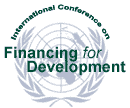
Department of Public Information - News and Media Services Division - New York
18-22 March 2002
19 March 2002
 |
International
Conference on Financing for Development Department of Public Information - News and Media Services Division - New York |
|
| Monterrey, NL, Mexico 18-22 March 2002 |
19 March 2002 |
|
PRESS BRIEFING BY CONFERENCE SPOKESWOMAN
United Nations Secretary-General Kofi Annan said today that a global deal was on the table in Monterrey calling for developing countries to adopt market-oriented policies, strengthen their institutions, fight corruption, respect human rights and the rule of law, and spend more on the needs of the poor. Rich countries, on the other hand, would support them with trade, aid, investment and debt relief, Susan Markham, Spokeswoman for the International Conference on Financing for Development, said at this afternoon's daily press briefing.
The Secretary-General said that last week's decisions by President George W. Bush and the European Union to increase development assistance, although not sufficient, suggested that the argument on aid had been won in principle,
Ms. Markham said. If the global deal was clinched in Monterrey, the Secretary-General said, millions of children would grow up to be productive members of their societies, instead of falling victim to AIDS, tuberculosis or malaria; and the world as a whole would be much better off.Ms. Markham said the Secretary-General would arrive in Mexico today and be in Monterrey tomorrow. He would attend a meeting of the International Chamber of Commerce tomorrow afternoon. On Thursday, he would address the Summit starting at 9 a.m. Copies of his speech were available under embargo.
She said the plenary had concluded last night with a decision to transmit the Monterrey consensus to the Summit. Today and tomorrow, delegates were meeting in round-table discussions. Although those were closed meetings, the third floor where they were being held was open to journalists. The chairs of the round tables would be invited to the evening press briefing.
The Spokeswoman said that, as of today, 53 heads of State and government had confirmed their intentions to participate at the Summit portion of the Conference, which would take place on Thursday and Friday. A total of 171 Member States would participate in that segment.
She said that, as of last night, 6,516 persons had been accredited to the Conference, among them, 1,833 delegations, 1,339 media and 681 non-governmental organizations.
Regarding interpretation facilities, she said they were available when not being used for other meetings. Seven of today's press conferences would have interpretation.
Asked whether there was concern about the absence of Asian leaders at the Conference, Ms. Markham said 171 countries were represented, but it was up to each country to decide what level of representation it would have. There was no cause for concern.
Would there be a communiqué by the heads of State at the end of the week? another correspondent asked.
The Spokeswoman said she had no knowledge of a communiqué after the heads of State retreat. The question should be addressed to the Government of Mexico.
She then introduced the Minister for Foreign Affairs of Venezuela, Luís Alfonso Davila, who attended as Chairman of the "Group of 77" developing countries and China.
He said that beyond a solution to the problems facing all the Group's members, it would be crucial that it form a team to follow up on the conclusions of the Conference. Between Monterrey and the World Summit on Sustainable Development in Johannesburg, there would be crucial conferences on ageing, children and food, he added.
Asked if he perceived Mexico as having moved away from the Group, Mr. Davila said he could not be a judge of Mexican policies and considered Monterrey an extraordinary initiative by President Vicente Fox to hold a conference to seek solutions to world problems.
To what extent could the activism of Venezuela's President Hugo Chavez hinder the work of the Summit and possibly antagonize the United States? another correspondent asked.
The Foreign Minister said the President's activities could not be perceived as a threat to any State. His stance in the international arena has been marked by a very clear multipolar approach to the world, where each region may have a chance to try and set itself up for development. There was no confrontation in that and, in fact, the United States and Venezuela were trade partners in the field of energy. Venezuela was interested in maintaining and developing its relations with the United States. However, it was necessary first to seek internal strength and development.
Asked what conclusions would make the Group of 77 consider the Conference a success, he replied that, in addition to political commitment, there must be proposals of effective aid. There would have to be permanent, quarterly assessment of follow-up in each member country, as well as a means to measure what had been achieved.
Asked if President Chavez would represent President Fidel Castro at the Summit, he said the Venezuelan leader would attend as President of the Group of 77, but would not represent any other country.
Press Conferences
Conference News